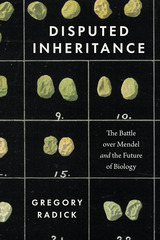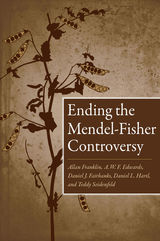2 books about 1822-1884

Disputed Inheritance
The Battle over Mendel and the Future of Biology
Gregory Radick
University of Chicago Press, 2023
A root-and-branch rethinking of how history has shaped the science of genetics.
In 1900, almost no one had heard of Gregor Mendel. Ten years later, he was famous as the father of a new science of heredity—genetics. Even today, Mendelian ideas serve as a standard point of entry for learning about genes. The message students receive is plain: the twenty-first century owes an enlightened understanding of how biological inheritance really works to the persistence of an intellectual inheritance that traces back to Mendel’s garden.
Disputed Inheritance turns that message on its head. As Gregory Radick shows, Mendelian ideas became foundational not because they match reality—little in nature behaves like Mendel’s peas—but because, in England in the early years of the twentieth century, a ferocious debate ended as it did. On one side was the Cambridge biologist William Bateson, who, in Mendel’s name, wanted biology and society reorganized around the recognition that heredity is destiny. On the other side was the Oxford biologist W. F. R. Weldon, who, admiring Mendel's discoveries in a limited way, thought Bateson's "Mendelism" represented a backward step, since it pushed growing knowledge of the modifying role of environments, internal and external, to the margins. Weldon's untimely death in 1906, before he could finish a book setting out his alternative vision, is, Radick suggests, what sealed the Mendelian victory.
Bringing together extensive archival research with searching analyses of the nature of science and history, Disputed Inheritance challenges the way we think about genetics and its possibilities, past, present, and future.
In 1900, almost no one had heard of Gregor Mendel. Ten years later, he was famous as the father of a new science of heredity—genetics. Even today, Mendelian ideas serve as a standard point of entry for learning about genes. The message students receive is plain: the twenty-first century owes an enlightened understanding of how biological inheritance really works to the persistence of an intellectual inheritance that traces back to Mendel’s garden.
Disputed Inheritance turns that message on its head. As Gregory Radick shows, Mendelian ideas became foundational not because they match reality—little in nature behaves like Mendel’s peas—but because, in England in the early years of the twentieth century, a ferocious debate ended as it did. On one side was the Cambridge biologist William Bateson, who, in Mendel’s name, wanted biology and society reorganized around the recognition that heredity is destiny. On the other side was the Oxford biologist W. F. R. Weldon, who, admiring Mendel's discoveries in a limited way, thought Bateson's "Mendelism" represented a backward step, since it pushed growing knowledge of the modifying role of environments, internal and external, to the margins. Weldon's untimely death in 1906, before he could finish a book setting out his alternative vision, is, Radick suggests, what sealed the Mendelian victory.
Bringing together extensive archival research with searching analyses of the nature of science and history, Disputed Inheritance challenges the way we think about genetics and its possibilities, past, present, and future.
[more]

Ending the Mendel-Fisher Controversy
Allan Franklin
University of Pittsburgh Press, 2008
In 1865, Gregor Mendel presented “Experiments in Plant-Hybridization,” the results of his eight-year study of the principles of inheritance through experimentation with pea plants. Overlooked in its day, Mendel's work would later become the foundation of modern genetics. Did his pioneering research follow the rigors of real scientific inquiry, or was Mendel's data too good to be true-the product of doctored statistics?
In Ending the Mendel-Fisher Controversy, leading experts present their conclusions on the legendary controversy surrounding the challenge to Mendel's findings by British statistician and biologist R. A. Fisher. In his 1936 paper “Has Mendel's Work Been Rediscovered?” Fisher suggested that Mendel's data could have been falsified in order to support his expectations. Fisher attributed the falsification to an unknown assistant of Mendel's. At the time, Fisher's criticism did not receive wide attention. Yet beginning in 1964, about the time of the centenary of Mendel's paper, scholars began to publicly discuss whether Fisher had successfully proven that Mendel's data was falsified. Since that time, numerous articles, letters, and comments have been published on the controversy.
This self-contained volume includes everything the reader will need to know about the subject: an overview of the controversy; the original papers of Mendel and Fisher; four of the most important papers on the debate; and new updates, by the authors, of the latter four papers. Taken together, the authors contend, these voices argue for an end to the controversy-making this book the definitive last word on the subject.
In Ending the Mendel-Fisher Controversy, leading experts present their conclusions on the legendary controversy surrounding the challenge to Mendel's findings by British statistician and biologist R. A. Fisher. In his 1936 paper “Has Mendel's Work Been Rediscovered?” Fisher suggested that Mendel's data could have been falsified in order to support his expectations. Fisher attributed the falsification to an unknown assistant of Mendel's. At the time, Fisher's criticism did not receive wide attention. Yet beginning in 1964, about the time of the centenary of Mendel's paper, scholars began to publicly discuss whether Fisher had successfully proven that Mendel's data was falsified. Since that time, numerous articles, letters, and comments have been published on the controversy.
This self-contained volume includes everything the reader will need to know about the subject: an overview of the controversy; the original papers of Mendel and Fisher; four of the most important papers on the debate; and new updates, by the authors, of the latter four papers. Taken together, the authors contend, these voices argue for an end to the controversy-making this book the definitive last word on the subject.
[more]
READERS
Browse our collection.
PUBLISHERS
See BiblioVault's publisher services.
STUDENT SERVICES
Files for college accessibility offices.
UChicago Accessibility Resources
home | accessibility | search | about | contact us
BiblioVault ® 2001 - 2024
The University of Chicago Press









